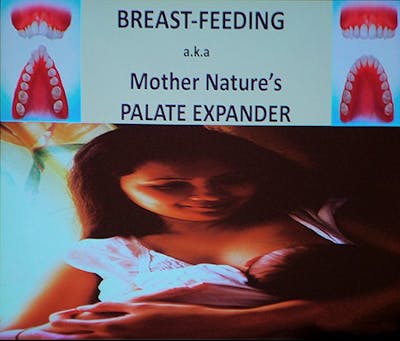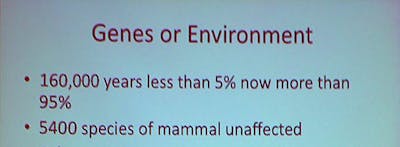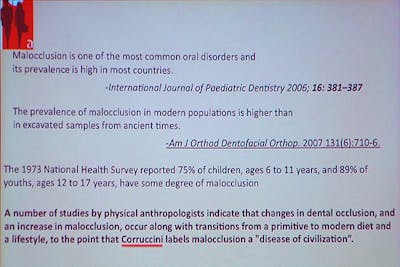How kids get straight teeth

Among a lot of great lectures at the Ancestral Health Symposium, there is one I have been meaning to write about for a long time now. I found it fascinating.
Why do so many Westeners develop crooked teeth? Bad genes is a common explanation. But is it true?
A new problem



According to the dentist and the orthodontist lecturing, today about 95 percent of the population has some form of malocclusion, meaning more or less crooked teeth and/or overbites and such. Many of these problems are corrected using braces while growing.
Amazingly, looking at skeletal remains of our ancestors only 5 percent of them had similar problems. And looking at wild animals we see the same scarcity of similar problems. Lions don’t need braces.
From a “natural” rate of 5 percent, all the way to 95 percent bad bites! What happened?



Something in our modern diet and/or lifestyle makes our jaws grow unappropriately. What? We don’t know for sure.
One speculative answer is an excess of refined carbs. This can increase insulin and IGF-1 to abnormal levels. These are growth factors and when they are too high it can disturb normal growth.
A second possible reason is not eating food that we need to chew hard. Only eating soft (fast) food is not normal for humans, and may stop the teeth and jaws from developing normally.
Breastfeeding
Another thing that may contribute is substituting formula for breastfeeding!



The foundation for the problem in crooked teeth is that the palate is not wide enough, not big enough for fitting all the teeth in it. Thus the teeth become crowded and crooked (above, left).
Breastfeeding apparently has a widening effect on the palate. At least according to the dentist lecturing. Potentially a lot of breastfeeding could thus give better chances for straight teeth (above, right).
Implications
Listening to this lecture a few months ago made me very anxious to give my new baby girl the best start in life, even when it comes to her teeth.
I’m happy to report that Klara is breastfeeding as much as she wants. And her palate? Looks very wide to me.
So far so good.
What do you think?
What do you think about the theories above?
More
Here is the lecture (unfortunately the quality of the recording is god-awful)